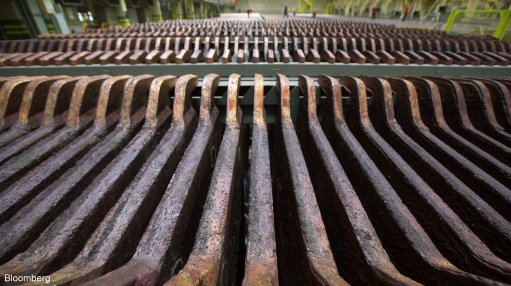Farlam Report raises issues about mining stability as a whole
Company Announcement - Farlam Report raises issues about mining stability as a wholeThe release of the long-awaited Farlam Commission, raises many serious questions relating to the mining industry as a whole, says the Bench Marks Foundation. It also shows how the Farlam Commission has failed us as a nation by not pronouncing on how Lonmin’s actions escalated the strike by changing the terminology from a labour dispute to a criminal issue and the importance of it using its links to Ramaphosa and NUM structures to break the strike.
John Capel, Executive Director for the Bench Marks Foundation, the leading research organisation involved in evaluating the mining industry and assessing the impact of the Marikana massacre on South African mining, says that what has become obvious whilst reading the report is that Lonmin are complicit through their actions and non-action of the serious human right abuses, and the deaths that occurred during and prior to 16th August 2012. “We don’t need a superficial report which does not give us real answers and fails to fully do justice to what many consider a crime.
“All Lonmin gets in this report is a slap on the wrist. After reading the report, we certainly feel that the list of blame should start with Lonmin as the most culpable and then include the South African Police and ministers named as second culpable. The previous minister of police, Nathi Mthethwa, should also be held culpable. “What is also extremely worrying is that the chain of command present in mines during the massacre seems to have been glossed over.
“We note that this is a factor that is common to just about every mining company in our country, whose boards are loaded with former ministers, premiers and directors general, all of which lead to the blurring of lines between the state and the corporate world,” says Capel. This undermines democracy and oversight. “We believe this practice of appointing politically connected individuals and politicians to the boards of mining companies is simply a way of seeking favour with government and circumventing legislative and regulatory obligations on the part of corporations." Capel says the Bench Marks Foundation believes that in order to stop this practice, a review of the Minerals and Petroleum Resource Development Act is needed. This does not seem to have been part of the Commission’s mandate, but most certainly should have been. The review is now urgent.
Capel notes again that although the Commission found that Lonmin could have done a lot more to resolve the strike and engage the workers, the company has gotten off lightly. It shocking, disturbing and not at all what we expected. Even Lonmin acknowledged this. Says Capel: “Lonmin chose to use their BEE partner to make a call to the minister of Mineral Resources, and police to criminalise the strike. What is clear from the Farlam report is that this was a labour issue and the use of police to deal with labour disputes is unacceptable and Lonmin should have been censored because of this. “The report differs to what President Zuma said: both the provincial commission and national commissioner of police seemed to be highly influenced by political considerations. But this was spearheaded by Lonmin.
“The company continually applied pressure on Ramaphosa to impress on the minister that this was not a wage dispute but a criminal act. “The change in language and attitudes with the minister of mineral resources and others after Ramaphosa’s intervention is evident. We believe this also changed the nature of the outcome of the strike”. Capel says that the report shows that Lonmin also used rubber bullets during the period, which was often in contradiction to the instructions of the police as not warranting such action. “It seems the violence escalated after Lonmin’s aggressive actions and after the NUM shooting of two workers. The report shows that Lonmin’s actions escalated the strike into a huge confrontation that led to the events that transpired on August 16th.
“What is clear from the Farlam report is that this was a labour issue albeit with violence overshadowing the real issues. They could have agreed to negotiate as the report suggests. But they did not, and for this Lonmin needs to accept responsibility for the outcome on that fateful day, “In addition to this, the commission should have called for the Minister of Mining to revoke the company’s licence until they could prove adherence to the social and labour plans and housing needs of their workers. “Although the report touched on some of the material conditions under which workers live, we feel that there was definitely not enough attention given to this essential area. The squatter-like conditions and the failure of social and labour plans to deliver tangible improvements were the underlying causes for the events that led to the massacre on 16 August 2012.
“These issues needed stronger language and criticism from Farlam!” Capel says the Bench Marks Foundation had hoped the commission would devote more time and recommendations around these material conditions, as Lonmin not only failed to abide by its many promises but also failed to comply with the requirements of the Mining Charter.
“The company should not be allowed to evade proper material support and monetary compensation for the aggrieved parties,” says Capel. “We insist that a compensation fund be established by Lonmin to compensate the widows and orphans for 20 years based on lost wages to these families. “Whilst we welcome the many recommendations and further investigations into the happenings and killings of the 34 workers, and the ten before them, we continue to highlight the lack of action relating to the material conditions and the political collusion. “All parties cannot be held equally responsible. It is our belief that a proper contextual analysis, at least, be done. This will certainly help towards addressing the situation and preventing a repeat of the events that occurred on 16 August 2012.
“The limited mandate the Farlam Commission had is not surprising. Nor is the lack of real and immediate actions to be taken. As we expected, the truth has remained the reserve of the elitist classes and the working class has come out battered and blamed,” says Capel. The Bench Marks Foundation released a report, Policy Gap 6, on the situation in the North West Province in July 2012, days before the Marikana massacre. It later released another report called Policy Gap 7: “Lonmin, Coping with Unsustainability” in October 2013 which looked at the company’s reporting of itself over a period of ten years in its Corporate Social Development Reports. Chairperson of the Bench Marks Foundation, Rt Rev Dr Jo Seoka, addressed workers during the strike and played a large role in ending the strike.
For more information on the Bench Marks Foundation, and to read their many reports, go to www.bench-marks.org.za
Comments
Press Office
Announcements
What's On
Subscribe to improve your user experience...
Option 1 (equivalent of R125 a month):
Receive a weekly copy of Creamer Media's Engineering News & Mining Weekly magazine
(print copy for those in South Africa and e-magazine for those outside of South Africa)
Receive daily email newsletters
Access to full search results
Access archive of magazine back copies
Access to Projects in Progress
Access to ONE Research Report of your choice in PDF format
Option 2 (equivalent of R375 a month):
All benefits from Option 1
PLUS
Access to Creamer Media's Research Channel Africa for ALL Research Reports, in PDF format, on various industrial and mining sectors
including Electricity; Water; Energy Transition; Hydrogen; Roads, Rail and Ports; Coal; Gold; Platinum; Battery Metals; etc.
Already a subscriber?
Forgotten your password?
Receive weekly copy of Creamer Media's Engineering News & Mining Weekly magazine (print copy for those in South Africa and e-magazine for those outside of South Africa)
➕
Recieve daily email newsletters
➕
Access to full search results
➕
Access archive of magazine back copies
➕
Access to Projects in Progress
➕
Access to ONE Research Report of your choice in PDF format
RESEARCH CHANNEL AFRICA
R4500 (equivalent of R375 a month)
SUBSCRIBEAll benefits from Option 1
➕
Access to Creamer Media's Research Channel Africa for ALL Research Reports on various industrial and mining sectors, in PDF format, including on:
Electricity
➕
Water
➕
Energy Transition
➕
Hydrogen
➕
Roads, Rail and Ports
➕
Coal
➕
Gold
➕
Platinum
➕
Battery Metals
➕
etc.
Receive all benefits from Option 1 or Option 2 delivered to numerous people at your company
➕
Multiple User names and Passwords for simultaneous log-ins
➕
Intranet integration access to all in your organisation


















